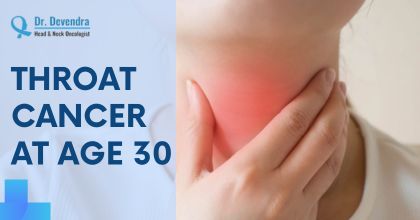Oral Cancer Treatment in Mumbai
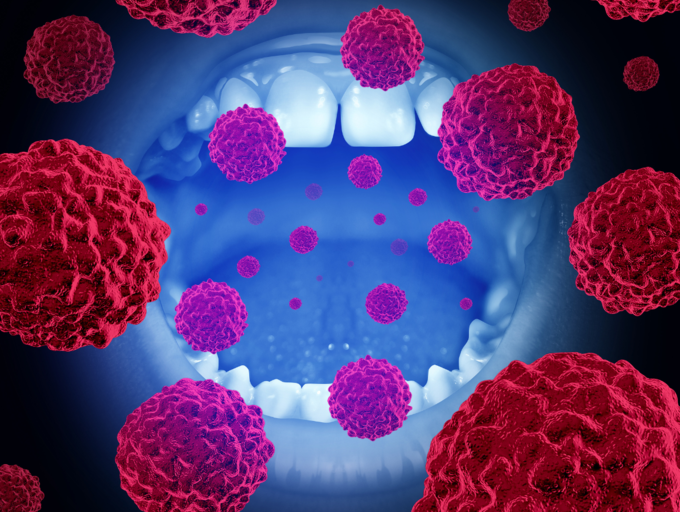
We regularly brush our teeth, floss, and use mouthwash, but how frequently do we genuinely consider the health of our mouths?
Oral health is frequently disregarded or taken for granted despite being an essential component of our well-being. Unfortunately, ignoring our dental health can lead to severe problems, such as the emergence of oral cancer. Oral cancer is a dangerous illness and potentially fatal disease that affects millions of people worldwide.
It can occur in any part of the mouth when abnormal cells in the lips, gums, tongue, or throat multiply and spread out of control. It is a potentially fatal illness that can lead to severe physical and psychological suffering, impacting not just the patient but also their loved ones.
“It is very important to follow a healthy oral care routine,” says Dr. Devendra, a well-known head and neck oncologist in Mumbai. “And it is equally important to seek medical attention on signs of any irregularities in the mouth.”
Initiate your journey towards improved health by booking a consultation with Dr. Devendra!
Causes of oral cancer
While the actual cause of the disease is not yet established, several factors can raise the risk of developing oral cancer
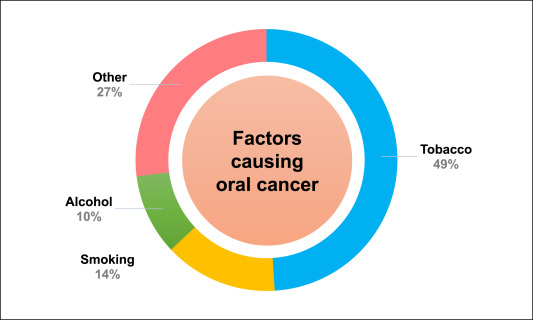
An estimated 70% of oral cancer exhibited the following:
- Use of tobacco products, such as cigarettes, cigars, and smokeless tobacco
- Drinking excessive amounts of alcohol regularly and frequently raises your risk of developing mouth cancer
- Excessive sun exposure without the use of sunblock on lips
- Infections with some HPV (human papillomavirus) strains have been associated with mouth cancer
- Inadequate brushing and flossing can result in the accumulation of dangerous bacteria and raise the risk of oral cancer due to poor oral hygiene
“Anyone can develop oral cancer regardless of lifestyle choices,” adds eminent oral cancer expert – Dr. Devendra. “An estimated 25% of persons who get mouth cancer do not smoke or have any other known risk factors.”
Finding treatment options for oral cancer? Explore the specialized care provided by Dr. Devendra Chaukar!
Symptoms of oral cancer
Some symptoms of oral cancer are listed below:

- Mouth sores that do not heal
- Swelling or lumps in the mouth, lips, tongue, floor of mouth, or throat
- Pain or discomfort in the mouth, throat, or tongue
- Difficulty chewing, swallowing, or speaking
- A persistent sore throat or hoarseness
- Red or white patches on the lips, tongue, or inside of the mouth
- Numbness or tingling in the mouth or lips
- Changes in the way teeth fit together or dentures fit
- Unexplained weight loss
- Ear pain without hearing loss
Please schedule an appointment with a highly-skilled head and neck oncologist like Dr. Devendra if you notice any of these signs.
Schedule a consultation with Dr. Devendra to discuss your oral cancer treatment plan and renewed healthy well-being!
Oral cancer treatment in Mumbai
Common oral cancer surgeries to treat various types of oral cancer or remove tumors of oral cavity include:
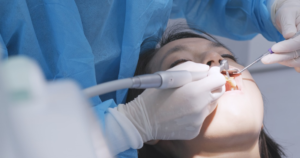
Primary tumor surgery: The removal of tumors through the mouth or a neck incision.
Glossectomy: Removal of your tongue, either whole or partially.
Mandibulectomy: Surgery to remove a small or large portion of the jawbone that has a tumor.
Maxillectomy: In this procedure, the hard palate, or bone roof of the mouth, is wholly or partially removed.
Neck dissection: Removal of affected lymph nodes from the neck.
Reconstruction: After significant tissue removal, you may need reconstructive surgery to close any gaps left by the oral cancer operation. Reconstructive surgery may occasionally involve removing healthy bone and tissue from other body parts.
Dr. Devendra is renowned for the safe and effective surgical management of oral cancer. He is among the preferred mouth cancer specialists for people seeking oral cancer treatment in Mumbai.
Oral cancer treatment in Mumbai may be combined with other therapies, such as:
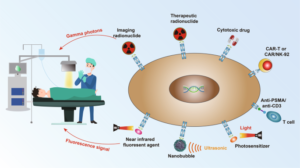
Chemotherapy (Chemo): This treatment uses anti-cancer medications to kill or stop cancer cell growth. It may be administered intravenously or orally.
Targeted therapy: Drugs or other substances like monoclonal antibodies that precisely target cancer cells or their environment are used in targeted therapy to kill cancer cells while sparing healthy cells harm. Monoclonal antibodies are laboratory-produced immune system proteins that fight off harmful pathogens, such as viruses or cancer cells.
Radiation therapy: High-energy radiation is used to kill cancer cells or reduce tumor size. Radiation can be given to cancer cells from within the body (brachytherapy) or outside (EBRT – external beam radiation therapy). The location and stage of cancer determine the kind of radiation therapy.
Immunotherapy: Immunotherapy, or biological therapy, uses medications to boost the body’s immune system to recognize and fight cancer cells.
Palliative care: It focuses on controlling symptoms and offering emotional support to people with advanced cancer to improve their quality of life. Instead of trying to cure cancer, it aims to give the patient the best level of comfort.
“Early stage mouth cancer detection and treatment can increase the likelihood of a good recovery from oral cancer,” advises Dr. Devendra, an eminent head and neck oncologist in Mumbai.
Stages of Oral Cancer
Oral cancer symptoms can be mild in the initial stages. Many people may not even be aware they have the disease until it has advanced.
Oral malignancies are staged utilizing the TNM method, where:
- T stands for the primary tumor’s size and location
- N means that your lymph nodes have been affected by the tumor. The lymph nodes are not involved in stage 1 & 2 mouth cancer
- M is a tumor that has metastasized or spread to other parts of your body
The stages of oral cancer are:
Stage 1: In stage 1 mouth cancer, the growth in your mouth is no larger than 2 centimeters with an invasion depth of 5mm or less. Both surgery and chemoradiation (chemo combined with radiation) work well in stage 1 oral cancer treatment.
Stage 2: The tumor is 2 centimeters or smaller but no greater than 4 centimeters in diameter, with invasion depth between 5mm and 10mm.
Stage 3: The tumor is over 4 centimeters without involving lymph nodes or involves 1 lymph node regardless of its size.
Stage 4: In stage 4 mouth cancer, cancer has spread to nearby tissues, lymph nodes, and other areas of the body. Stage 4 mouth cancer treatment may involve immunotherapy apart from surgical procedures and chemoradiation.
“People need to pay more attention to even the slightest of persistent changes in their oral cavity,” advises oral cancer surgeon Dr. Devenra. “Detection and treatment in the initial or beginning oral cancer stages has helped many people to get back to their healthier self and live fulfilling lives.”
With over 20 years of expertise, Dr. Devendra Chaukar is the go-to doctor for patients considering oral cancer treatment in Mumbai.
Oral cancer surgery cost in Mumbai
Oral cancer surgery cost in Mumbai can vary based on several variables, including:
- the type of procedure required
- the severity of the disease
- the hospital or clinic where the process is carried out
- the surgeon’s training and expertise
The average cost of oral cancer treatment in Mumbai can be between INR 50,000 and INR 5,00,000 or more. This price may or may not include extra hospitalization, anesthesia, and aftercare charges.
On average, the oral cancer surgery cost in Mumbai is approximately INR 2,80,096 (USD 3505), with a range of INR 60,574 (USD 758) to INR 5,04,893 (USD 6318).
Please remember:
Maintaining good dental health is essential to our overall health and should not be ignored. We may lower our risk of oral cancer and ensure a better, happier life by practicing good oral hygiene habits and getting immediate treatment for oral health issues. It is crucial for those who are receiving treatment for oral cancer to keep in mind that they are not alone and that there is hope for a better future.
It can take time and effort to recover from oral cancer. Still, it is possible to do so with the support of family, close friends, and a skilled medical team. The likelihood of a favorable outcome from treatment is increased by early detection of oral cancer, which is made possible by routine dental or oral health examinations.
Discover personalized oral cancer treatment options with Dr. Devendra Chaukar.
Frequently Asked Questions
What are the signs of early stage tongue cancer?
The following are possible warning signs of early stage tongue cancer:
- a chronic sore throat or the sensation that something is in the throat
- difficulty swallowing or discomfort
- a recurring white or red spot in the mouth or on the tongue
- a tongue lesion or sore that either does not heal, heals slowly or disappears before returning
- persistent numbness or pain in the tongue
- a tiny lump or bump that gradually becomes larger on the tongue
- Speech or voice changes, such as slurred speech or a persistent hoarse voice
- Unaccounted-for weight loss
It is significant to remember that non-cancerous illnesses might also be responsible for these symptoms. However, seeing a doctor if any of these symptoms last longer than 2 weeks is crucial.
How is oral cancer diagnosed?
A physical examination, including a thorough head and neck exam, a biopsy, and imaging studies, may be used to diagnose oral cancer. Blood tests and dental exams may also be done sometimes.
A doctor or dentist may detect some mouth cancers or pre-cancers during an examination. Most oral cancers are discovered after the patient exhibits signs or symptoms.
Can oral cancer be cured permanently?
Factors like the type and stage of cancer, the patient’s health, and the response to treatment affect the likelihood of a cure. Early detection and treatment of oral cancer can sometimes lead to a complete cure. Regular follow-up checkups and lifestyle changes like quitting smoking and drinking less alcohol can lower the risk of recurrence and developing new cancers.
Late-stage or metastatic oral cancer may not be curable. In such cases, treatment focuses on improving the patient’s quality of life and managing symptoms.

